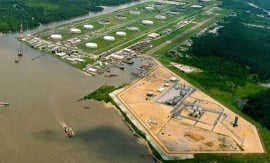 Nigerian militants from the Movement for the Emancipation of the Niger Delta (MEND) claimed to attack several pipelines of oil companies including Chevron yesterday, shitting in 100,000 barrels of crude a day. The attacks come in response as Nigerian forces over the past two weeks began a major operation against the rebel group. MEND claims to be fighting in part to ensure the impoverished delta region receives a greater portion of proceeds from oil and gas pumped from local lands. The attack comes a week after MEND announced a blockade of shipping channels, although it appears to have lacked the forces to enforce such an order.
Nigerian militants from the Movement for the Emancipation of the Niger Delta (MEND) claimed to attack several pipelines of oil companies including Chevron yesterday, shitting in 100,000 barrels of crude a day. The attacks come in response as Nigerian forces over the past two weeks began a major operation against the rebel group. MEND claims to be fighting in part to ensure the impoverished delta region receives a greater portion of proceeds from oil and gas pumped from local lands. The attack comes a week after MEND announced a blockade of shipping channels, although it appears to have lacked the forces to enforce such an order.
The recent attack against Chevron has done little to rile the oil markets, unlike last year when an attack in the region prompted oil prices to jump over 2% in one day. Nigeria, the fifth largest supplier of oil to the US with reserves of 36 billion barrels of oil and 187 tcf of gas, now only produces about 1.6 million barrels a day, roughly half of its capacity according to Petroleum Minister of State Odein Ajumogobia. This drop in output reflects the recent up tick in violence, although the country has had difficulty in reaching its output potential due to regional instability. Over the past several years an estimated 20% of Nigeria’s oil production had been shut in.
The attacks highlight concern over future supplies as oil prices marched upwards to $62 a barrel this month, up from $32 earlier this year. The price reflects greater concern over future supply as new projects are being postponed around the world from the US to Russia and Saudi Arabia. The number of rig actively exploring for oil and gas is down over 43% since last September, which will lead to supply pressures over the medium term. However, unlike last year, producers have far greater capacity to increase production.
In Nigeria, however, the government and oil companies have difficulty in protecting the vast network of pipelines and will continue to remain targets of attacks that will hamper production. A spokesman from MEND stated earlier today that “Nobody should go home with his two eyes closed because the war has just begun.”

MEND is not the only group to respond to the recent military intervention in the region. The Ijaw National Congress, the political group of the dominant tribe in the delta region, called on the government to stop “this callous and unwarranted display of state power” and “pour in relief materials.”